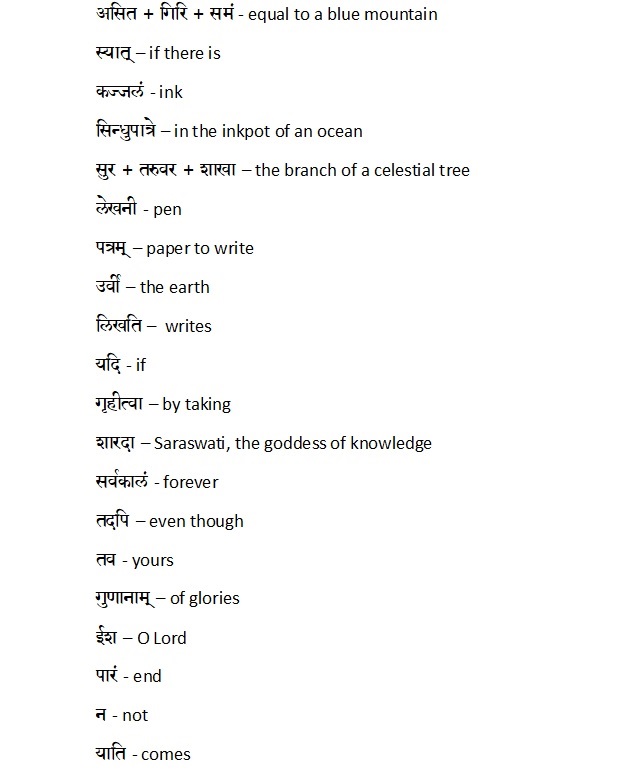Shiva Mahimna Stotra
Shloka 32


Meaning: O Lord Shiva! If in the inkpot of an ocean, there is an ink equal to the blue mountain and Saraswati, the goddess of knowledge, takes a pen made from a branch of a celestial tree and describes your glories forever on the earth using it as a paper, even then your glories will not come to an end.
Reflections: Pushpadanta’s poetic imagination has fully blossomed in this shloka.
I have mentioned it in the introduction, but I will cite it here again to remember how Sri Ramakrishna’s mind was uplifted by this shloka and made him go into spiritual ecstasy. This was recorded by Swami Saradananda in his book1.
“One day, the Master (Sri Ramakrishna) entered one of the Shiva temples of Dakshineswar and began to recite the Shiva Mahimna, a hymn in praise of the Deity. He was beside himself in ecstasy as he recited the following verse: “O Lord! Imagine if the ink is prepared by dissolving a blue mountain into an ocean, the biggest branch of the celestial tree becomes the pen to write, and the earth the writing paper, and if by taking all these things, Saraswati, the goddess of Learning, writes your glories forever, even then she cannot describe your glories.”
“While the Master was reciting the above verse, he intensely felt the glory of Shiva in his heart, and he lost himself. He forgot the hymn, the Sanskrit language of the hymn, the order of the verses, and so on, and repeatedly cried aloud, “O Lord, how can I express Your infinite glory?” Tears poured down his cheeks, chest, and clothes, finally dampening the floor.”
We generally are so busy with our work, and enjoyment, or our minds are filled with worries that we missed the wonders presented around us. People who focus their minds on the mysteries of life and the world, get filled with awe being touched with the infinite divine power. If we stop running around with our routines, sit quietly for a while in solitude, and reflect upon ‘what makes me see, hear, touch, taste, and smell?’ or ‘how my heart and the digestive system work in the body?’, or ‘what makes me think?’, we will be filled with wonder.
In an article written by Rachel Tompa2, we get an idea of how scientists’ minds realize this wonderful divine power and how limited is our comprehension.
She writes, “If you ask Christof Koch, Ph.D., Chief Scientist and President of the Allen Institute for Brain Science, how close we are to understanding our own brains, he scoffs.
“We don’t even understand the brain of a worm,” Koch said.
The lab roundworm, more technically known as Caenorhabditis elegans, houses 302 neurons and 7,000 connections between those neurons in its microscopic body. Researchers have painstakingly mapped and described all those connections in recent years. And we still don’t fully understand how they all work synergistically to give rise to the worm’s behaviors.
We, humans, have approximately 86 billion neurons in our brains, woven together by an estimated 100 trillion connections, or synapses. It’s a daunting task to understand the details of how those cells work, let alone how they come together to make up our sensory systems, our behavior, our consciousness.”
Let us think about how this earth, sun, and other planets are rotating and creating an environment for us to live. If the sun comes closer to the earth, everything on earth will be burnt. If the sun goes away from the Earth, then everything on Earth will be frozen to death. When we think how this divine power is manifesting itself and functioning through us all, we find it is mind-boggling.
Anything we touch with our mouth is considered ‘jhutha’ or polluted. Sri Ramakrishna said that Brahman has not become ‘jhutja’ because we cannot describe Brahman. Whatever we describe becomes limited.
Taittiriya Upanishad (2.9) says:

One who realizes Brahman finds that the mind and speech fall short to comprehend or describe Brahman.
Swami Vivekananda reflected this thought in his following line which the devotees of Sri Ramakrishna sing every day:

“I salute again and again the Lord (Brahman) who is beyond the comprehension of the mind and the speech.”
The bottom line is that the glories of the Lord (Brahman) cannot be described fully. They are infinite.
[1. Sri Ramakrishna and His Divine Play by Swami Saradananda, translated by Swami Chetanananda, page 487.
2. Rachel Tompa is Senior Writer at the Allen Institute. She covers news from all scientific divisions at the Institute. Get in touch at rachelt@alleninstitute.org.]